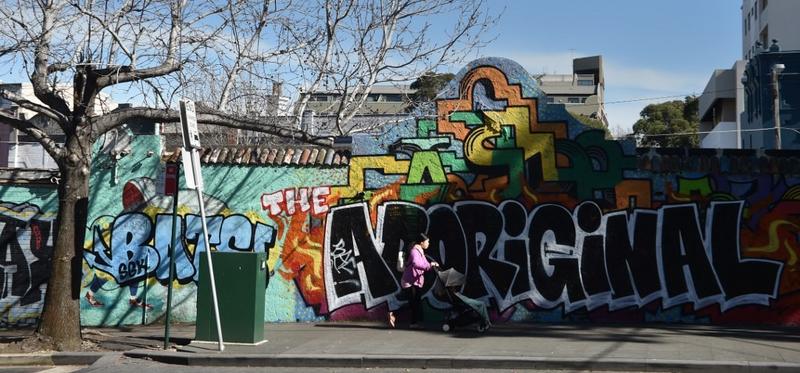 A woman pushes a baby past a graffity wall with the words "The Aboriginal" in reference to Australia's indigenous people on August 17, 2016. (PETER PARKS / AFP)
A woman pushes a baby past a graffity wall with the words "The Aboriginal" in reference to Australia's indigenous people on August 17, 2016. (PETER PARKS / AFP)
SYDNEY - As Australia prepares for its national day of festivities on Jan. 26, Indigenous woman Rita Wright will be protesting the celebrations at a march in Sydney.
Australia Day marks the date the British fleet sailed into Sydney Harbour in 1788 to start a penal colony, viewing the land as unoccupied despite encountering settlements.
For Wright, holding national celebrations on the highly sensitive date reinforces a legacy of mistreatment of Indigenous people. She said the date of the national holiday should be changed.
As Australia prepares for its national day of festivities on Jan. 26, Indigenous woman Rita Wright will be protesting the celebrations at a march in Sydney
“I always thought Captain Cook owned this land and not the Aboriginal people,” said Wright, referring to the British explorer who mapped Australia’s eastern coastline in 1770, paving the way for the establishment of the colony.
“But as I got older and stronger I was so proud that I’m Aboriginal.”
Snatched off the street at the age of two and re-homed at a church mission, Wright, of the Muruwari people from Australia’s east, is part of the Stolen Generation, a dark era in the continent’s history.
READ MORE: Indigenous Australian group blocks Uluru access route over virus fears
She said she was forced to sleep in a chicken coop at the mission as a child.
The push to change the date of Jan. 26 celebrations has never been stronger, with protests growing in size every year.
“This is the day that started all of our people being murdered, our children being stolen, our land being stolen and for people to celebrate it, it’s pretty disgusting,” said artist and Darug woman, Leanne Watson.
The life expectancy of Indigenous Australians is eight years shorter than for non-Indigenous people and they are over-represented in prison, government statistics showed.
The Jan. 26 debate remains highly emotive in Australia.
Prime Minister Scott Morrison told journalists last week that the day represents how far the country has come since the fleet arrived.
ALSO READ: Indigenous history: Australia changes National Anthem wording
“It wasn’t a particularly flash day for the people on those vessels either,” he said.
Morrison also criticised a decision by cricket authorities to no longer refer to Jan. 26 as “Australia Day”.
The Australian leader last month amended the national anthem to remove reference to the country being “young and free” amid calls to recognise its Indigenous people are the oldest continued civilization in the world.


